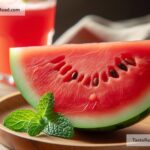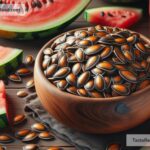Can Watermelon Seeds Be Eaten and Are They Nutritious?
When you think of watermelon, you probably picture its bright red flesh and refreshing taste on a hot summer day. But what about the little black or white seeds hidden in the fruit? Do you spit them out, toss them aside, or even avoid buying watermelons with seeds altogether? Many people wonder, Can watermelon seeds be eaten, and are they good for you? The answer might surprise you! Watermelon seeds are not just edible but also packed with nutrients. In this blog, we will explore their benefits and how you can include them in your diet.
Are Watermelon Seeds Safe to Eat?
Yes, watermelon seeds are completely safe to eat! If you accidentally swallow a seed while enjoying your watermelon, you don’t need to worry. Despite the old myth that a watermelon plant will grow in your stomach (don’t worry, that’s not true!), these seeds pass through your digestive system easily.
These seeds are most nutritious when they’re cooked or prepared in a specific way. Eating them raw straight out of a watermelon isn’t harmful, but they’re much easier to digest and taste better after being roasted, sprouted, or blended into recipes.
What Makes Watermelon Seeds Nutritious?
Watermelon seeds are small but mighty when it comes to nutrition. They are loaded with vitamins, minerals, healthy fats, and plant-based protein. Let’s take a closer look at the nutrients found in watermelon seeds:
1. Rich in Magnesium
Magnesium is an important mineral that helps keep your body running smoothly. It plays a role in energy production, muscle function, and bone health. One ounce (about 28 grams) of roasted watermelon seeds contains roughly 140 milligrams of magnesium, meeting over one-third of your daily recommended intake!
2. Good Source of Iron
Iron is essential for making red blood cells and carrying oxygen throughout your body. Watermelon seeds contain iron, which can contribute to your daily needs. While the iron in plant-based foods is not as easily absorbed as the iron from meat, pairing watermelon seeds with vitamin C-rich foods (like watermelon itself!) can help your body absorb the iron better.
3. Packed with Healthy Fats
Watermelon seeds contain polyunsaturated and monounsaturated fats, often called “good fats.” These fats support heart health, help lower bad cholesterol levels, and provide energy. While watermelon seeds contain some fat, it’s important to eat them in moderation as part of a balanced diet.
4. Plant-Based Protein
Protein is essential for building and repairing muscles, skin, and other tissues in your body. Watermelon seeds are a surprising source of protein, offering approximately 8 grams per ounce. This makes them a great snack for vegetarians and vegans looking for plant-based protein options.
5. Full of Vitamins and Antioxidants
Watermelon seeds contain B vitamins like niacin and folate, which help maintain healthy skin, nerves, and metabolism. They are also rich in antioxidants, which protect your cells from damage caused by harmful molecules called free radicals.
How to Eat Watermelon Seeds
Raw watermelon seeds can be eaten directly from the fruit, but their hard shells make them difficult to digest. To get more nutrition and better taste, consider preparing them the following ways:
1. Roast Them
Roasted watermelon seeds make a crunchy and delicious snack. Here’s how to make them at home:
– Wash and dry the seeds.
– Toss them with a pinch of salt or your favorite seasoning.
– Spread them on a baking sheet and roast at 325°F (160°C) for about 15 minutes, or until golden brown.
2. Sprout Them
Sprouting seeds enhances their nutrient content and makes them easier to digest. To sprout watermelon seeds:
– Soak them in water for about 24 hours.
– Drain and rinse them several times over the next few days until you see tiny sprouts.
Sprouted seeds can be added to salads or eaten as a snack.
3. Blend Them into Recipes
You can use watermelon seeds in smoothies, baked goods, or even grind them into flour for making breads and pancakes. They’re versatile and can boost the nutritional value of your meals.
How Much Should You Eat?
While watermelon seeds are nutritious, portion size matters. Eating too many seeds can add extra calories to your diet, as they do contain fats. Stick to a handful of roasted seeds (about an ounce) as a snack or as part of a meal to keep your consumption balanced.
Should You Avoid Seedless Watermelons?
Seedless watermelons are convenient, but they lack the nutritional benefit of watermelon seeds. If you enjoy eating seeds or want to try including them in your diet, opt for watermelons with seeds the next time you’re at the store.
Final Thoughts
Watermelon seeds are a hidden treasure often overlooked by many. They’re not just safe to eat but also a tasty, nutrient-packed addition to your diet. Whether roasted as a snack, sprouted for salads, or blended into recipes, watermelon seeds offer several health benefits.
So, the next time you’re enjoying a watermelon, don’t let those little seeds go to waste. Give them a try and discover how this small snack can make a big difference for your health!

